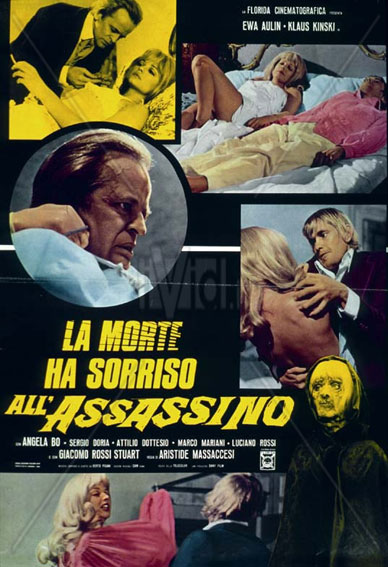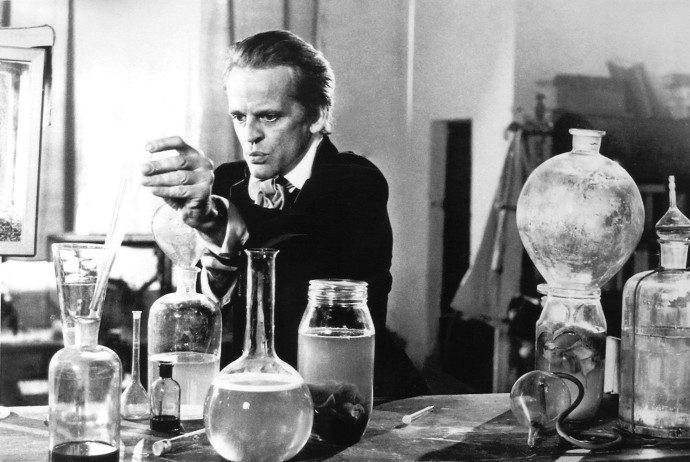Dir: Aristide Massaccesi
Star: Ewa Aulin, Sergio Doria, Angela Bo, Klaus Kinski
a.k.a. Death Smiled at Murder
Director Massaccesi is better known under one of the forty-plus pseudonyms he used, Joe D’Amato, being one of the most infamous grindhouse directors of the seventies and eighties. He was a pioneer of the “mockbuster,” a similarly-titled movie with the same themes as a successful mainstream film, e.g the 11 Days, 11 Nights series inspired by 9 1/2 Weeks, or Ator the Invincible, which came out soon after Conan the Barbarian. But he’s probably best know for such titles such as Erotic Nights of the Living Dead and Porno Holocaust. Those are more or less exactly as they sound: a mix of sex and violence which could be both soft- and hard-core. Having seen some of these, his reputation as the “evil Ed Wood” seemed largely justified.
This, however, dates from early in his career – so early, in fact, he directed it under his own name! – and is largely competent, made with more care than later examples of his work which I’ve seen. Perhaps it was from before he adopted a more jaded and cynical approach, as voiced by a character in Emanuelle’s Revenge [note the mis-spelling of the first word!], who appears to echo D’Amato’s own frequently-expressed thoughts, “We’re not making artsy-farty crap for intellectual faggots. We’re out to make money!” Instead, there are certainly no shortage of “artsy-fartsy” elements, even if it also contains its fair share of nudity and sex. In terms of style, it’s somewhere between the giallo and Gothic genres, combining the more in-your-face and whodunnit aesthetics of the former, with the dreamlike mysteries of the latter.
It’s a period piece, set around 1909, and begins with Franz (Luciano Rossi) bemoaning the death of his sister, Greta (Aulin). The next thing we see is a coach accident outside the house of Walter and Eva von Ravensbrück (Doria + Bo); the driver is killed, but the passenger is Greta, and is knocked unconscious. She recuperates in their house, under the eye of the local physician, Dr. Sturgess (Kinski). but a couple of problems soon arise. The maid, apparently knowing something, hands in her notice and leaves, but on the way out takes both barrels of a shotgun to the face. Then, both Walter and Eva fall in love with the new house-guest. When Eva realizes her husband is winning the battle, she takes drastic action, luring Greta to the basement and walling her up there. Problem solved, right? Nope – as anyone familiar with classic horror will know, it’s never a sound solution. Eva soon starts seeing both the hale and hearty Greta, alternating with a decayed version, and when she tears the bricks down to make sure she is seeing things, discovers the body is no longer there.
 You’ll notice that Klaus’s character only receives a passing mention. That’s because, despite his co-star billing with Aulin, his role is largely incidental. He has a sideline, working to discover the secret of life in a basement laboratory with his mute assistant, and a medallion worn by Greta appears to have provided a breakthrough. One imagines he sensed something was up when he was able to stab her in the eyeball with a pin, and not even receive a blink; that, along with the odd scar on the side of her neck where the IV tube of elixir went in. Anyway, he successfully revives his own test subject, only to be offed, along with his assistant, by (presumably) the same person who killed the maid. Exit Mr. Kinski, before the half-way point has been reached, though he’d return for another Massaccesi movie later in the year, Heroes in Hell.
You’ll notice that Klaus’s character only receives a passing mention. That’s because, despite his co-star billing with Aulin, his role is largely incidental. He has a sideline, working to discover the secret of life in a basement laboratory with his mute assistant, and a medallion worn by Greta appears to have provided a breakthrough. One imagines he sensed something was up when he was able to stab her in the eyeball with a pin, and not even receive a blink; that, along with the odd scar on the side of her neck where the IV tube of elixir went in. Anyway, he successfully revives his own test subject, only to be offed, along with his assistant, by (presumably) the same person who killed the maid. Exit Mr. Kinski, before the half-way point has been reached, though he’d return for another Massaccesi movie later in the year, Heroes in Hell.
To this point, the film hasn’t so much been playing the cards close to its chest, as leaving the table entirely, and looking at them from a locked room in the next building. Even by the end, it’s far from certain that all the questions raised have even potentially been answered, and indeed, it seems more are raised. Walter’s father shows up, and appears to have had quite the relationship with Greta himself: yet he didn’t make any connection between her disappearance and the sudden arrival of a beautiful blonde at his son’s house? The film also treats us to an entirely incomprehensible moment, where a bunch of flowers thrown by Greta turn into a cat, which then scratches someone’s face off, over a period of what seems like several minutes. [Look, it’s a freakin’ cat: you outweigh it by a factor of about twenty, and gravity is on your side] “None of this makes any sense,” says an investigating policeman at one point, and by the time the final credit roll, you’ll almost certainly be agreeing wholeheartedly.
However, for all the questionable plot elements, I can’t deny that Massaccesi does a good job of generating a dreamlike atmosphere, where even the more dubious moments have a certain plausibility. The first return of Greta from the tomb is particularly well-done, and delivers a fine wallop [I didn’t see it coming, that’s for sure], while there are also a couple of other sequences that are well-put together and directed with finesse. Aulin is undeniably lovely to look at, and it’s entirely credible why both husband and wife would fall for her. This isn’t one to watch if you’re in a demanding mood; I’d probably recommend laying off the caffeine instead, and watching it just before bedtime, when your critical faculties are dulled toward sleep. Seen through that prism, it’s a lusciously-shot exercise with the air of a lesser story from Edgar Allen Poe, and provides a more than pleasant way to pass 90 minutes.
